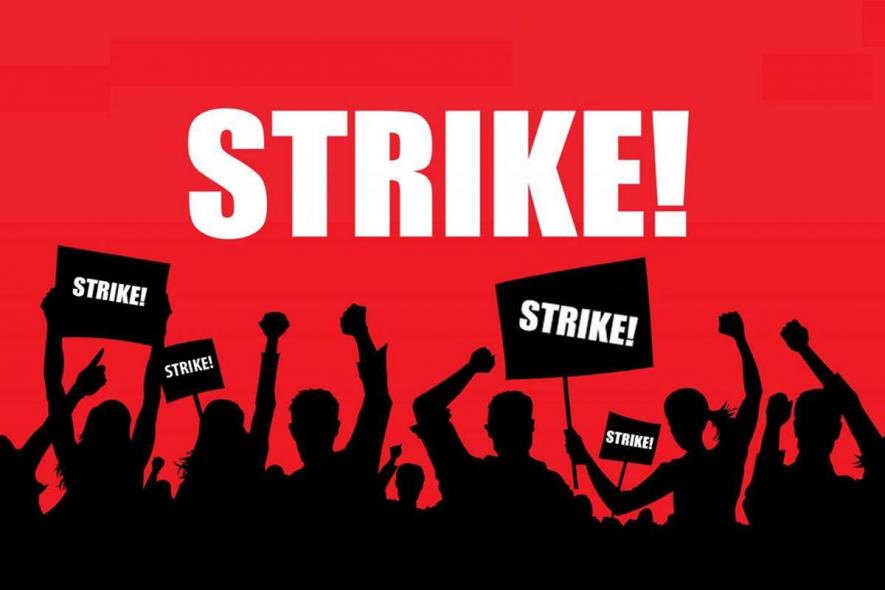French Unions Call New Nationwide Strikes, Protests on Jan 31 Against Pension Reforms

Representational Image. Image Courtesy: Peoples Democracy
Paris: At least 1.1 million people protested on the streets of Paris and other French cities amid nationwide strikes against plans to raise the retirement age, but President Emmanuel Macron insisted he would press ahead with the proposed pension reforms.
Emboldened by the high turnout, French unions on Thursday announced new strikes and protests January 31, vowing to try to get the government to back down on plans to raise the standard retirement age from 62 to 64. Macron says the measure is needed to keep the pension system financially viable, but unions say it threatens hard-fought worker rights.
During a news conference at a French-Spanish summit in Barcelona, Spain, Macron said that "we must do that reform" to "save" the pension system.
"We will do it with respect, in a spirit of dialogue but also determination and responsibility," he added.
As Macron spoke, riot police pushed back against some protesters throwing projectiles on the sidelines of the largely peaceful Paris march. Some other minor incidents briefly flared up, leading officers to use tear gas.
Paris police said that 38 people had been detained.
In a country with an ageing population and growing life expectancy where everyone receives a state pension, Macron's government says the reform is the only way to keep the system solvent.
Unions propose a tax on the wealthy or more payroll contributions from employers to finance the pension system instead. Polls suggest most French people also oppose the reform.
Strikes across France severely disrupted transport, schools and other public services across France.
More than 200 rallies were staged around France on Thursday, including a large one in Paris involving all France's major unions.
The Interior Ministry said more than 1.1 million people protested across France, including 80,000 in Paris. Unions said more than 2 million people took part nationwide, and 4,00,000 in Paris.
Big crowds also turned out for protests against previous efforts at retirement reform, during Macron's first term and under former President Nicolas Sarkozy in 2010. But none of those drew more than 1 million people according to government estimates.
Jean Paul Cachina, 56, a worker in human resources, joined the march in the French capital — a first ever for him.
"I am not here for myself," he said. "I am here to defend the youth and workers doing demanding jobs. I work in the construction industry sector and I'm a first-hand witness of the suffering of employees."
Many young people were among the Paris crowd, chanting "the youth is protesting. Macron you are finished." High school student unions had urged members to join the protests.
Nathan Arsac, 19, a student and member of the UNEF union, said: "I'm afraid of what's going to happen next. Losing our social achievements could happen so fast. I'm scared of the future when I'll be older and have to retire."
The economic cost of the strikes wasn't immediately clear. The government worries that a big show of resistance Thursday could encourage unions to continue with protracted walkouts that could hobble the economy just as France is struggling against inflation and trying to boost growth.
Most train services around France were cancelled, including some international connections, according to the SNCF rail authority. About 20 per cent of flights out of Paris' Orly Airport were cancelled and airlines warned of delays.
The Ministry of National Education said between 34% and 42% of teachers were on strike, depending on schools.
Thierry Desassis, a retired teacher, called the government's plan "an aberration."
Many French workers expressed mixed feelings about the government's plan and pointed to the complexity of the pension system.
Quentin Coelho, 27, a Red Cross employee, felt he had to work Thursday despite understanding "most of the strikers' demands". With an aging population in the country, he said, raising the retirement age "isn't an efficient strategy. If we do it now, the government could decide to raise it further in 30 or 50 years from now. We can't predict."
Coelho said he doesn't trust the government and is already saving money for his pension.
French Labour Minister Olivier Dussopt acknowledged "concerns" prompted by the pension plans but said the government rejected other options involving raising taxes — which he said would hurt the economy and cost jobs — or reducing pensions.
The French government is formally presenting the pension Bill on Monday and it will head to Parliament next month. Its success will depend in part on the scale and duration of the strikes and protests.
Most opposition parties, including the Left and the Far-Right, are strongly against the plan. Macron's centrist alliance lost its parliamentary majority last year, yet still has the most important group at the National Assembly, where it has a good chance of being able to ally with the conservative The Republicans party to approve the pension reforms.
Under the planned changes, workers must have worked for at least 43 years to be entitled to a full pension. For those who do not fulfil that condition, like many women who interrupted their careers to raise children or those who studied for a long time and started working late, the retirement age would remain unchanged at 67.
Those who started to work early, under the age of 20, and workers with major health issues would be allowed early retirement.
Get the latest reports & analysis with people's perspective on Protests, movements & deep analytical videos, discussions of the current affairs in your Telegram app. Subscribe to NewsClick's Telegram channel & get Real-Time updates on stories, as they get published on our website.




















